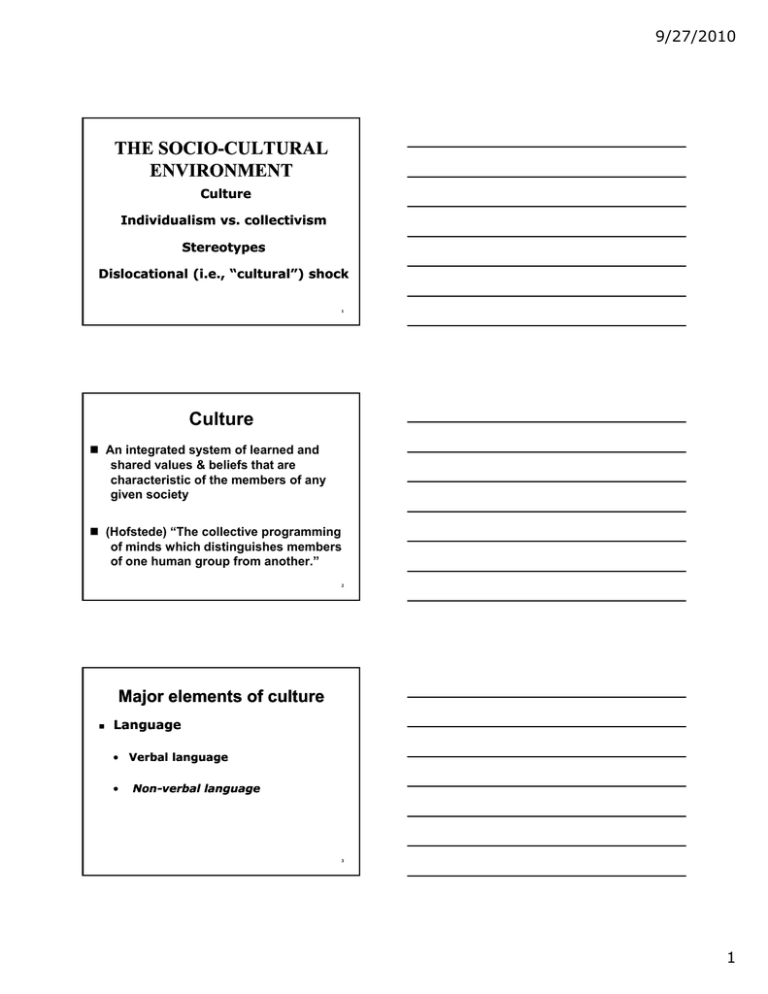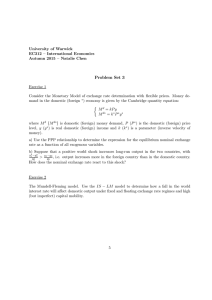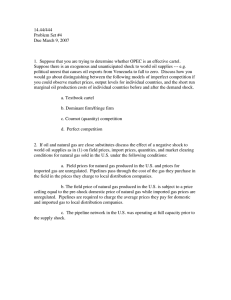THE SOCIO THE SOCIO--CULTURAL CULTURAL ENVIRONMENT
advertisement

9/27/2010 THE SOCIOSOCIO-CULTURAL ENVIRONMENT Culture Individualism vs vs. collectivism Stereotypes Dislocational (i.e., “cultural”) shock 1 Culture An integrated system of learned and shared values & beliefs that are characteristic of the members of any given society (Hofstede) “The collective programming of minds which distinguishes members of one human group from another.” 2 Major elements of culture Language • Verbal language • Non--verbal language Non 3 1 9/27/2010 Religion Class and caste Manners and customs Cultural attitudes 4 Attitudes toward one’s personal role Work and achievement Authority and responsibility Risk and uncertainty • Fatalism Science and the scientific method Wealth 5 Attitudes toward other groups Age Gender Class and caste Family or tribe Religion 6 2 9/27/2010 Region Foreigners Oth Other non-members nonb Political groups Job or place of work 7 Other attitudes Life and death Status Individualism vs. collectivism 8 Individualism vs. collectivism 9 3 9/27/2010 Individualism A social structure that places a strong focus on the rights and responsibilities of the individual Loose social ties between individuals Large measure of individual freedom 10 Individualism People are expected to look after themselves and their immediate family. • Extended families are not usually significant. • Nepotism is generally viewed as undesirable and unacceptable. 11 Individualism People have very limited responsibility for nonnon-members. • H However, th the governmentt may provide economic and social safety nets.. nets 12 4 9/27/2010 Managerial implications of individualism Individual responsibility: The individual is expected to make decisions. • Entrepreneurship is rewarded. • Rewards are based upon individual merit. 13 Collectivism A social structure that places a strong focus on the rights and responsibilities of the group • People are born into cohesive groups. • Social ties between individuals in the group are very tight. 14 Collectivism People are expected to protect the interests of the group in return for receiving the protection and support of the group. group • Nepotism is the norm. 15 5 9/27/2010 Collectivism People have very limited responsibility for nonnon-members. Th governmentt is The i nott as likely lik l to t provide strong safety nets. • Those without a group can be very exposed. 16 Managerial implications of collectivism The focus in decision making is upon group consensus. • D Decisions i i are expected t d to t come from the boss, based upon that group consensus. • The individual is not expected to make important decisions. 17 Reward systems in a collective society are based upon the group, not the individual. • The good of the company supersedes that of the individual. e.g., “Japan, Inc.” 18 6 9/27/2010 19 Stereotypes Mental pictures that attribute common characteristics to a group g p • • • • People Animals Things Events 20 Stereotypes are: Generalizations Mentall shortcuts h A natural part of the human mental process. 21 7 9/27/2010 Origins of stereotypes Family Experience Friends Media 22 Stereotypes are necessary in order for us to be able to absorb and understand all that goes on around us or happens to us. 23 We all use stereotypes! They are: • Unavoidable • Useful 24 8 9/27/2010 Stereotypes can be: Positive or negative Accurate or inaccurate 25 Name some positive stereotypes. • Europeans • Nurses • Women / men • College professors 26 We cannot avoid the use of stereotypes! Therefore, we need to: • Recognize that we stereotype. Be conscious that we are doing it. • Be cautious and fair in stereotyping. 27 9 9/27/2010 Although stereotypes are of groups, we also tend to apply them to individuals. • Useful initially • However, thereafter we must be open--minded, observe carefully, open and measure the individual – not the stereotype of a group. 28 Finally, be aware that others also stereotype us! 29 Major categories of stereotypes Ethnic or racial Gender Age National or regional origin Education Job or place of employment Religion Political affiliation Associations Activities 30 10 9/27/2010 31 Dislocational shock The general disorientation and discomfort experienced by an individual living in a different environment 32 Dislocational shock may occur domestically as well as internationally. internationall 33 11 9/27/2010 Culture is only one source of dislocational shock. • Economic shock • Political shock • Legal shock • Weather shock 34 Generally, but not always, the dislocational shock results from being in a new location. • Sometimes the shock comes to us. • Or we might deliberately seek the new environment where we currently reside. 35 Almost everyone experiences dislocational shock to some extent when placed in a new environment for an extended period. People differ greatly in their flexibility and adaptability to new environments. 36 12 9/27/2010 Time line of dislocational shock Can appear very quickly or only after weeks or months. It can last for weeks or months, or even longer. • Some people never overcome it. 37 Phases of dislocational shock “Honeymoon” period Rejection R j ti period i d Adjustment period 38 Secondary and tertiary rejection and adjustment periods A Acceptance t or adaptation d t ti • Biculturalism 39 13 9/27/2010 Symptoms of “dislocational” shock Loneliness Boredom Sense of loss Criticism of the environment 40 Withdrawal Compulsive behavior (e.g., drinking, eating, sleeping) Interpersonal tensions Physical ailments Poor job performance 41 Forewarned is forearmed Dislocational shock can usually be survived. • Be B prepared d -- it can’t ’t b be avoided. id d • Be patient and flexible. 42 14 9/27/2010 Be open open--minded and try to avoid being too negative. Develop D l empathy: mpathy th : The Th generalized li d ability to see the world through the eyes of other people 43 Don’t withdraw -- try to experience the new situation as fully as possible. Network--Talk Network-Talk with others who have already experienced and overcome the shock. • Avoid the complainers Stay busy. Get involved. 44 Learn as much about the new environment as possible. 45 15 9/27/2010 Return shock Some people become so adjusted to their foreign lifestyle that they are reluctant to return home! • “Going native” Returning home can produce its own dislocational shock! 46 47 16




